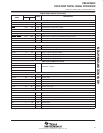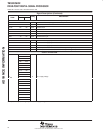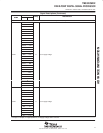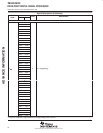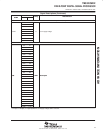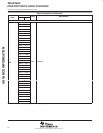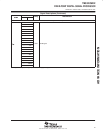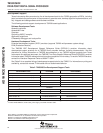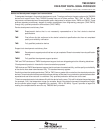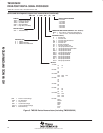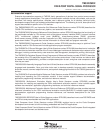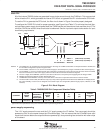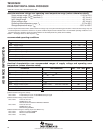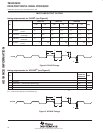
TMS320C6202
FIXED-POINT DIGITAL SIGNAL PROCESSOR
SPRS072B – AUGUST 1998 – REVISED AUGUST 1999
23
POST OFFICE BOX 1443 • HOUSTON, TEXAS 77251–1443
device and development-support tool nomenclature
To designate the stages in the product development cycle, TI assigns prefixes to the part numbers of all TMS320
devices and support tools. Each TMS320 member has one of three prefixes: TMX, TMP, or TMS. Texas
Instruments recommends two of three possible prefix designators for support tools: TMDX and TMDS. These
prefixes represent evolutionary stages of product development from engineering prototypes (TMX/TMDX)
through fully qualified production devices/tools (TMS/TMDS).
Device development evolutionary flow:
TMX Experimental device that is not necessarily representative of the final device’s electrical
specifications
TMP Final silicon die that conforms to the device’s electrical specifications but has not completed
quality and reliability verification
TMS Fully qualified production device
Support tool development evolutionary flow:
TMDX Development-support product that has not yet completed Texas Instruments internal qualification
testing.
TMDS Fully qualified development-support product
TMX and TMP devices and TMDX development-support tools are shipped against the following disclaimer:
“Developmental product is intended for internal evaluation purposes.”
TMS devices and TMDS development-support tools have been characterized fully, and the quality and reliability
of the device have been demonstrated fully. TI’s standard warranty applies.
Predictions show that prototype devices (TMX or TMP) have a greater failure rate than the standard production
devices. Texas Instruments recommends that these devices not be used in any production system because their
expected end-use failure rate still is undefined. Only qualified production devices are to be used.
TI device nomenclature also includes a suffix with the device family name. This suffix indicates the package type
(for example, GJL), the temperature range (for example, blank is the default commercial temperature range),
and the device speed range in megahertz (for example, -250 is 250 MHz). Figure 5 provides a legend for
reading the complete device name for any TMS320 family member.
ADVANCE INFORMATION



